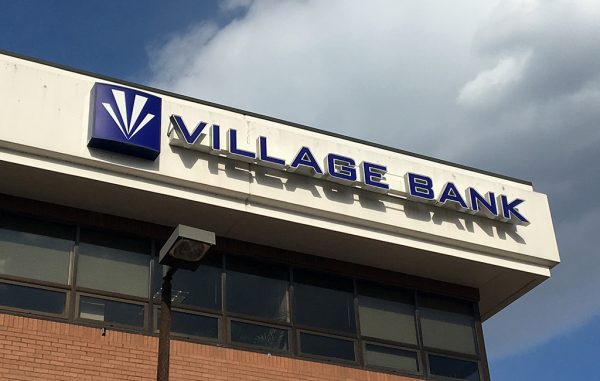A local bank is buying back the last lingering pieces left over from a recession-era stimulus plan – and saving a few shekels in the process.
Village Bank last week completed a private debt placement to raise $5.7 million, the bulk of which will be used to redeem the remaining shares of preferred stock it issued in 2009 as part of its participation in the government’s Troubled Asset Relief Program, better known as TARP.
The Midlothian-based bank originally gave the U.S. Treasury 14,738 shares of preferred stock in exchange for $14.7 million meant to prop it up during the recession. It was one of eight local banks that participated in TARP, through which the U.S. government pumped $191 million into the Richmond banking market.
The Treasury sold the Village shares at a steep discount in a 2013 auction for a total of $5.67 million. The bulk of those shares were purchased and have since been owned by unidentified institutional investors, to whom the bank has been paying a 9 percent dividend.
With the private placement completed, CEO Bill Foster said the bank will complete the redemption March 30.
“They are the last of the TARP shares,” Foster said. “This was that last little chapter. We just wanted to wait for what the right time was for us. This was the right time.”
The move will save the bank $160,000 annually because the interest rate on the debt is lower than the 9 percent dividend it had to pay on the preferred shares. The interest rate is also tax deductible, whereas the dividend payments were not, Foster said.
The buyers in the private placement were larger institutions, community banks and some individuals, he said.
Village was the last remaining local bank to still have remnant TARP floating around. Most bought their shares back directly from the Treasury, while others took a similar route to Village’s.
It hired investment banking firm FIG Partners to handle the debt raise. Williams Mullen was its legal counsel during the process.
A local bank is buying back the last lingering pieces left over from a recession-era stimulus plan – and saving a few shekels in the process.
Village Bank last week completed a private debt placement to raise $5.7 million, the bulk of which will be used to redeem the remaining shares of preferred stock it issued in 2009 as part of its participation in the government’s Troubled Asset Relief Program, better known as TARP.
The Midlothian-based bank originally gave the U.S. Treasury 14,738 shares of preferred stock in exchange for $14.7 million meant to prop it up during the recession. It was one of eight local banks that participated in TARP, through which the U.S. government pumped $191 million into the Richmond banking market.
The Treasury sold the Village shares at a steep discount in a 2013 auction for a total of $5.67 million. The bulk of those shares were purchased and have since been owned by unidentified institutional investors, to whom the bank has been paying a 9 percent dividend.
With the private placement completed, CEO Bill Foster said the bank will complete the redemption March 30.
“They are the last of the TARP shares,” Foster said. “This was that last little chapter. We just wanted to wait for what the right time was for us. This was the right time.”
The move will save the bank $160,000 annually because the interest rate on the debt is lower than the 9 percent dividend it had to pay on the preferred shares. The interest rate is also tax deductible, whereas the dividend payments were not, Foster said.
The buyers in the private placement were larger institutions, community banks and some individuals, he said.
Village was the last remaining local bank to still have remnant TARP floating around. Most bought their shares back directly from the Treasury, while others took a similar route to Village’s.
It hired investment banking firm FIG Partners to handle the debt raise. Williams Mullen was its legal counsel during the process.
